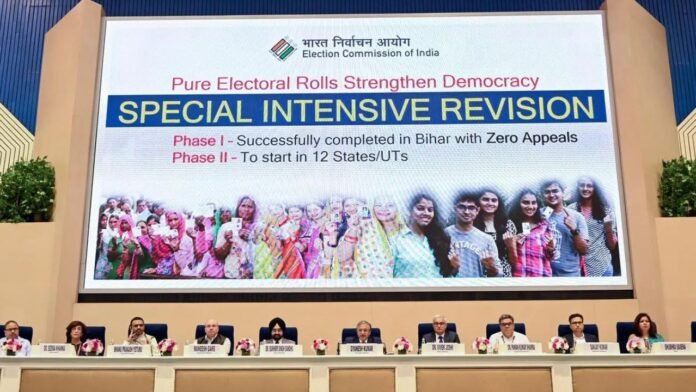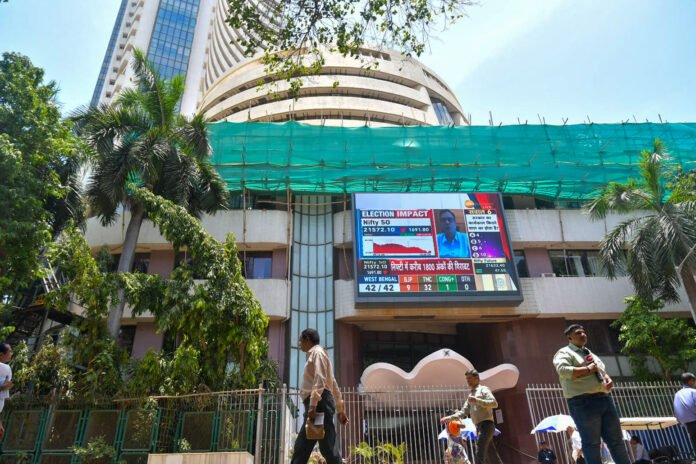The Special Intensive Revision (SIR) carried out by the Election Commission of India is a nationwide voter roll clean-up designed to update, verify, and correct the electoral list far more thoroughly than routine annual revisions. Unlike the usual updates, SIR is a focused, time-bound exercise that involves house-to-house checks, typically conducted before major elections. Its main purpose is to produce an accurate and inclusive electoral roll by identifying and removing duplicate, deceased, or ineligible voters while adding those who were left out earlier.
Special Intensive Revision (SIR)
SIR is essentially a large, detailed re-examination of voter lists undertaken using the Election Commission’s constitutional and legal powers. It is usually initiated before major polls or when rolls have not been updated for years. The exercise includes distributing fresh enumeration forms, doorstep verification by Booth Level Officers (BLOs), document checks, removal of invalid entries, and adding eligible voters. A recent example is the SIR 2025 in Bihar, where over 8 crore voters were re-verified.
Key points include:
- Legal authority comes from Article 324 of the Constitution and Section 21(3) of the Representation of the People Act, 1950, which allows a “special revision of the electoral roll.”
- It aims to include every eligible citizen aged 18 and above while eliminating duplicates, deceased voters, and incorrect details.
- Unlike simple annual revisions, SIR blends full-scale enumeration with summary updates, which is why it is considered “Special Intensive.”
Significance of Special Intensive Revision
SIR plays an important role in strengthening India’s electoral process:
- Eliminates ghost entries and repeated registrations, making elections more transparent.
- Updates rolls to reflect migration, new voters, and rapid urbanisation.
- Improves representation for marginalised groups, including young voters and internal migrants.
- Boosts public trust by ensuring that the list is clean and up to date.
- Helps streamline election-day operations such as booth creation and ballot planning, as seen in Jaipur where new polling stations were added.
Objectives of SIR
The exercise is driven by clear goals:
- Accuracy: Removing duplicates, deceased persons, and ineligible names.
- Inclusion: Adding eligible citizens, especially first-time voters, migrants, and those earlier omitted.
- Legitimacy: Reinforcing the principle of “one person, one vote” through cleaner rolls.
- Demographic alignment: Updating the voter list to match changing residency patterns and population shifts.
- Election preparedness: Ensuring that major elections proceed smoothly with minimal disputes.
Legal Framework Behind SIR
The legal foundation of SIR includes:
- Article 324(1): Grants the ECI full control over elections.
- Article 326: Ensures adult suffrage for all citizens aged 18+.
- Representation of the People Act, 1950: Sections 16 and 19 define eligibility; Section 21(3) empowers special revisions.
- Registration of Electors Rules, 1960: Describes procedures for enrolment and revision. Though the phrase “Special Intensive Revision” doesn’t explicitly appear in the rules, it is used administratively for clarity.
How the Special Intensive Revision Works
The SIR process includes several structured steps:
- Notification and Planning: ECI announces the timeline and qualifying date (like July 1, 2025 for Bihar).
- Door-to-Door Checks: BLOs visit every household to distribute pre-filled “Enumeration Forms.”
- Document Submission: Voters enrolled after a specified cut-off date may need to submit documents for verification.
- Verification and Updates: Officials review forms, remove invalid entries, and add new voters. In Jaipur, 741 new booths were created during SIR.
- Draft Roll and Claims: A draft roll is published; objections are invited. Following a Supreme Court order, deletions in Bihar had to be publicly listed.
- Final Roll: The final cleaned roll is published and frozen before the election.
Key Features of SIR
SIR stands out because it:
- Covers every household comprehensively.
- Is conducted within a strict timeline.
- Prioritises excluded and mobile populations.
- Uses digital tools for alerts and online submissions.
- Applies stronger document checks for new entries.
Bihar’s Special Intensive Revision 2025
The large-scale SIR in Bihar offers several insights:
- The qualifying date was July 1, 2025, covering citizens turning 18 by October 1, 2025.
- Over 8 crore voters were reviewed with the help of BLOs and nearly 4 lakh volunteers.
- Stricter documentation was required for voters added after January 2003.
- The Supreme Court instructed the ECI to publicly release deletion details.
- Civil society groups such as ADR raised concerns about potential exclusion.
- Several cities, including Jaipur, added hundreds of new polling stations to manage crowding.
Challenges Facing Special Intensive Revision
Despite its strong framework, SIR faces multiple hurdles:
- Risk of excluding genuine voters: Extra documentation may disadvantage the poor, migrants, and marginalised communities.
- Pre-election timing issues: Large revisions close to elections may lead to confusion or allegations of bias.
- Procedural ambiguity: The term “Special Intensive Revision” is not clearly defined in rules.
- Resource limitations: Large teams and technology are required for effective implementation.
- Digital barriers: Citizens in rural or remote areas may struggle with online processes.
- Political disputes: Parties may challenge the process, as seen in the Bihar SIR PIL being heard by the Supreme Court.
Way Forward
To strengthen SIR, several policy improvements can help:
- Create clear, transparent guidelines on documents, timelines, and processes.
- Reduce documentation requirements for previously registered voters.
- Use technology for better mapping, enumeration, and grievance redressal.
- Ensure inclusion through special camps, multilingual awareness drives, and mobile units.
- Engage with political parties and civil society to address concerns early.
- Publish deletion and addition lists to build public trust.
- Conduct post-revision audits to correct errors before elections.
- Coordinate SIR with delimitation and polling station planning.
Role of the Election Commission
The Election Commission leads the entire SIR process—from announcing schedules to supervising field verification and approving final rolls. Using its powers under Article 324, the ECI ensures inclusion of eligible voters and removal of inaccurate entries.
Role of the Chief Electoral Officer
The Chief Electoral Officer in each state implements SIR on the ground. They coordinate with officials at various levels, oversee fieldwork, monitor data collection, manage awareness campaigns, and look after grievance handling. Their assessments help determine the final form of the voter roll.
Special Intensive Revision (UPSC Perspective)
The ECI has launched another round of SIR across 12 states and UTs—including Tamil Nadu, Kerala, West Bengal, and Puducherry—ahead of their upcoming Assembly elections. Beginning November 4, 2025, the revision covers more than 51 crore voters, with the final roll set for release on February 7, 2026. Voters must verify eligibility using one of 13 documents, a requirement shaped by earlier reforms during the Bihar SIR. Some states have raised concerns about large-scale verification. Assam is excluded due to the ongoing NRC process, making this one of the biggest voter verification efforts since 2002.
Stay informed on all the latest news, real-time breaking news updates, and follow all the important headlines in world News on Latest NewsX. Follow us on social media Facebook, Twitter(X), Gettr and subscribe our Youtube Channel.



